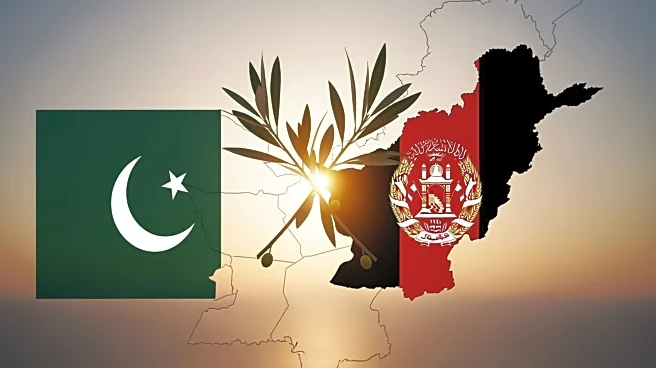What's Happening?
Pakistan and Afghanistan have agreed to a 48-hour ceasefire following intense border clashes that resulted in numerous casualties. The ceasefire was reportedly requested by Afghanistan, although the Taliban government claims it was at Pakistan's insistence.
The violence erupted in the Spin Boldak district of Afghanistan's Kandahar province, with both sides accusing each other of initiating the conflict. Pakistan's military reported killing dozens of Afghan security forces and militants, while the Taliban claimed to have killed several Pakistani soldiers and seized military posts. The clashes have heightened tensions in a region already destabilized by militant groups such as the Islamic State and al-Qaida.
Why It's Important?
The ceasefire is crucial in preventing further escalation of violence in a region already fraught with instability. The ongoing conflict between Pakistan and Afghanistan has implications for regional security, particularly with the presence of militant groups seeking to exploit the situation. The violence has also led to civilian casualties and displacement, exacerbating humanitarian concerns. The ceasefire offers a temporary reprieve and an opportunity for diplomatic efforts to address underlying issues, such as Pakistan's accusations of Afghanistan harboring armed groups. The situation remains precarious, with potential impacts on regional alliances and international relations.
What's Next?
Both countries are expected to engage in dialogue to find a long-term solution to the border conflict. The ceasefire provides a window for diplomatic negotiations, potentially involving regional powers like Saudi Arabia and Qatar, who have previously appealed for peace. The international community, including China and Russia, may also play a role in mediating the conflict. The situation remains fluid, with the possibility of renewed violence if diplomatic efforts fail. Monitoring the ceasefire's adherence and any subsequent agreements will be crucial in assessing the conflict's trajectory.
Beyond the Headlines
The border clashes highlight the complex geopolitical dynamics in the region, with historical tensions dating back to the Soviet-Afghan War. The involvement of militant groups adds another layer of complexity, as both countries grapple with internal security challenges. The conflict underscores the need for comprehensive regional strategies to address militancy and promote stability. The humanitarian impact, including civilian casualties and displacement, calls for increased international attention and support.















